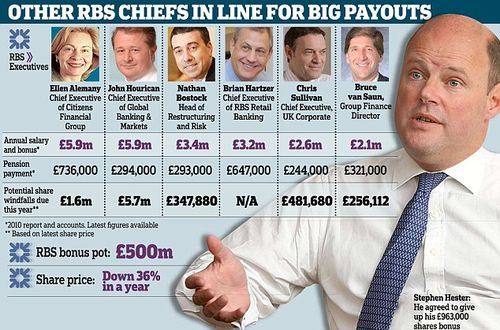
It’s bonus season and, as in previous years*, the media and politicians stir up a row over rich pickings and knighthoods.
Some say there’s even a “whiff of the lynch mob” in the air.
Certainly in the UK it’s getting ridiculous as this week we saw the hysterical media coverage over Stephen Hester getting a million pound bonus for steering Royal Bank of Scotland (RBS) through this crisis, immediately followed by the Queen stripping Fred Goodwin, the former RBS CEO, of his knighthood.
Are these hysterics deserved?
Possibly some of it, but the bonus rage is not justified.
Sure, Stephen Hester’s bonus sounds amazingly rich to those who aren’t in a job of that stature, but a million pound bonus for someone whose package comes to over £7 million a year is about right.
This is because not all bonuses are the same, and the danger is that everything is lumped into a lynch mob cauldron of hate against bankers per se.
Take Stephen Hester’s bonus.
It’s not a bonus for being a risk-taking casino capitalist; it’s a bonus for meeting some of his objectives, managing a bank through a crisis.
That is normal business practice as many people get a bonus for annual achievement.
It is normal to have management-by-objectives and to reward staff for achieving those objectives.
In most firms, staff will get a bonus as a percentage of their salary each year, based upon achieving objectives in terms of staff management, customer satisfaction, revenues and profits.
That is usual and no-one in any other business sector is being forced to give up their annual bonus in the same way.
The trouble today is that any mention of ‘banker’ and ‘bonus’ gets people angry.
A bit like saying ‘daylight’ and ‘robbery’, a banker’s bonus is immediately seen as bad.
But the bonus that should be seen as bad is the one that is given with no recognition of the risks being taken, or the long-term return of that risk.
You hear several stories of bankers during the boom years making risky investments in complex instruments and getting multimillion pound rewards, only to leave the bank just before their investment portfolio crashes and burns.
No recognition of the risks that were taken, and no ability for the bank to get those bonuses back.
That was the mistake made in the boom years, and that is being addressed.
Multimillion pound packages are now taxed at 50% and are tied to long-term shares in the bank rather than cash.
The cash bonus days are over.
But how did we get to a stage where a banker can get a million pound bonus simply for being there?
It all goes back to the days of partnerships in the market maker world.
Checkout the history of Goldman Sachs, Morgan Stanley and you find investment banking bonuses originate from private partnerships, where the partners risk their own funds in order to share the rewards of their capital at risk.
Equally, the rewards were distributed on the basis of how well each partner performed, and bonuses were not a God-given right.
Unfortunately, as Goldmans reluctantly IPO’d in 1999 as the last private partnership in the investment world trying to keep this status, the bonus culture rippled over and the reckless risk of what is now referred to as ‘casino capitalism’, spilled over into the mainstream banking system.
What happened?
Well, the private partnerships were now competing with other mainstream banks and, in order to attract the best talent, the proprietary banks offered similar bonus packages and benefits as the private partnerships.
The difference however is that the mainstream banks didn’t have partners who put their own capital at risk.
They were just workers.
Staff.
Employees.
That’s where the bonus culture came from and where it all went wrong.
It’s being addressed today, but it got out of hand for a while and the hardest aspect is how to manage the transition from an over-the-top bonus culture to one that is managed through regulation.
You cannot force banks to be tough on bonuses.
As soon as you do that, you potentially drive a bank to other shores and lose fiscal revenue, as the UK government realises all too well.
The banking sector contributes over £50 billion to the Treasury’s coffers each year, and they don’t want to lose that income.
And banks gradually shake out poor talent over time anyway. That’s why 200,000 bankers lost their jobs last year.
Finally, bankers who really want to invest and put capital at risk will evolve over time. They’re called private equity managers.
So, the bonus battle will rage, but the media headlines are in the extreme.
In fact, much of it is just envy over wealth and the fact that some banking people were paid millions for doing nothing in the past.
We'll know this crisis is truly over therefore when the media's rage stops being with a manager in a bank, to any manager in any business who is being over- or under- paid.
From today’s Daily Wail
More top RBS bankers urged to give up bonuses

Chris M Skinner
Chris Skinner is best known as an independent commentator on the financial markets through his blog, TheFinanser.com, as author of the bestselling book Digital Bank, and Chair of the European networking forum the Financial Services Club. He has been voted one of the most influential people in banking by The Financial Brand (as well as one of the best blogs), a FinTech Titan (Next Bank), one of the Fintech Leaders you need to follow (City AM, Deluxe and Jax Finance), as well as one of the Top 40 most influential people in financial technology by the Wall Street Journal's Financial News. To learn more click here...




















